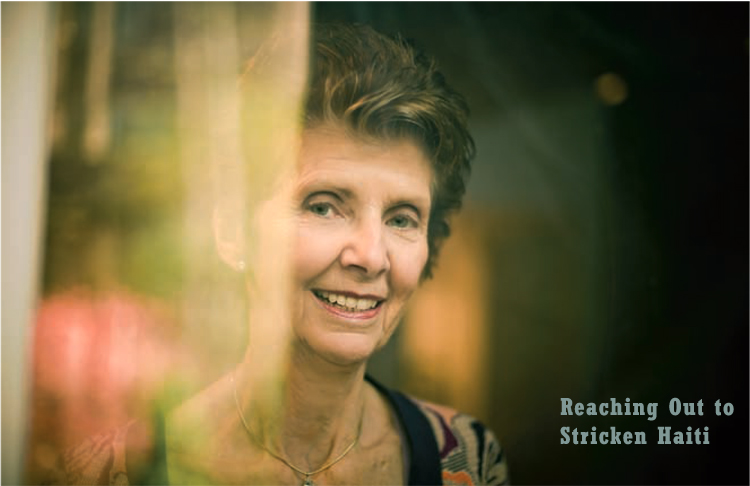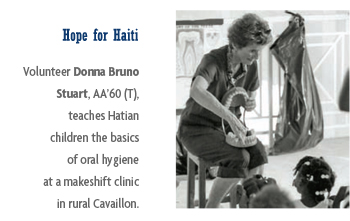
Directed by Professor Stephen Hollis and well trained for the vigors of theater life, FDU students rise to the challenge of Shakespeare’s “Two Gentlemen of Verona.”
The United Nations Academic Impact promises to address worldwide challenges and engage students in global concerns.
Catch a sneak preview of the award-winning film “Favorite Son” with writer, director and professor Howard Libov.
Professor David Hanson’s images of the World Trade Center have become a moving historical tribute.
John Vitale describes his FDU study abroad experience in Japan, from mountain villages to the bustling Tokyo.Alumni Profile
International Alumnus Finds Global Success
John Mangeli, BS'64 (M)Alumni Profile
Reaching Out to Stricken Haiti
Donna Bruno Stuart, AA'60 (T)


S SHE RODE THROUGH the streets of earthquake-shattered Port-au- Prince, Haiti, in April 2010, Donna Bruno Stuart, AA’60 (T), could hardly believe her eyes. Everywhere she looked, there were scenes of utter destruction caused by the tragic earthquake of last January 12 — a catastrophe that reportedly killed an estimated 230,000 people and left most of the poverty-wracked country’s infrastructure in ruins.
“Even before the earthquake, Haiti was already the poorest country in the Western Hemisphere,” says Donna, a retired dental hygienist who joined a U.S. medical team providing emergency health care services to the Haitians. She “wanted to give back” by helping the victims of the disaster. “The people of Haiti have suffered immensely,” she said.
After arriving in the Maryland-sized Caribbean nation with a 27-member team that included doctors, nurses, translators and a social worker from the nonprofit NOVA Hope for Haiti, Donna went to work in a temporary medical clinic located at Cavaillon, in southwestern Haiti. Her assignment: to teach children and their parents about the importance of achieving good dental hygiene by brushing regularly and consuming fewer sugar-loaded snacks.
During the next seven days, while working in temperatures that sometimes hovered near 100 degrees, Donna, the doctors and the nurses would hand out hundreds of donated toothbrushes and tubes of toothpaste. On some occasions, when translators were lacking, she struggled to communicate the basics of effective tooth brushing and good oral hygiene.

“We had several translators along with us, but a lot of the time they were needed for more urgent medical cases, and I was on my own,” recalls the veteran dental hygienist. “But I soon learned that if I got the children engaged in drawing ‘happy teeth’ and ‘sad teeth’ on paper, I could use this kind of ‘show and tell’ to emphasize the importance of brushing regularly. I soon learned how to use their drawings — along with a large set of artificial teeth I’d brought along — to get my message across.” Donna estimates that she was also able to teach several hundred children the art of effective tooth-brushing.
Donna says she taught small groups of Haitian mothers the essentials of good oral hygiene for infants and small children. One key lesson was about the importance of making sure that babies and toddlers are not put to bed with bottles of milk at night, in order to prevent tooth decay. (Good dental practice calls for filling the bottles with water, instead.)
A native of Bridgeport, Conn., the former Donna Bruno spent two years on FDU’s Metropolitan Campus in Teaneck in the late 1950s. “I lived in Bancroft Hall, and it was the first time I’d been away from home, so it was all very exciting,” she remembers. “The FDU dental clinic was brand-new, and I remember going in there every day to learn about the practice of dental hygiene with the excited feeling that I would soon be starting a professional career. I really enjoyed the labs and the classroom teaching.”
After earning her AA degree in 1960, she went on to enjoy a 27-year career as a dental hygienist and office manager in Wyckoff, N.J. Along the way, she had three children with her former husband, James Stuart, DDS’61(T), and spent 21 years as a homemaker while the children were growing up. Donna now lives in Mahwah, N.J.
“When I look back on my years of working and bringing up kids [she now has six grandchildren], I realize how truly fortunate I’ve been,” she says with a quiet smile. “After I retired [in 2008], I realized that I wanted to try and give something back to a world that has treated me so well for so long.”
During her week in Haiti, Donna lived in a “small but clean and pleasant hotel” and slept under mosquito netting every night. “It was challenging at times, but it was nothing, compared to what the people of Cavaillon were living with,” she says. “Most of them had no running water, no electricity and barely enough food to survive.
“It was a remarkable experience, to say the least,” she recalls. “These people had absolutely nothing after the earthquake, and yet most of them were extremely kind and respectful with each other — and with those of us on the NOVA medical team. … They’re blessed with a resiliency and a kind of spiritual joyfulness that was a wonder to behold.
“When you see that kind of courage and patience in the face of so much devastation, it really lifts your spirits. Far from becoming depressed, I found that my experience in Haiti made me more thankful than ever for the goodness of people and the value of human life.”
To learn more about NOVA Hope for Haiti and how you can help, visit http://novahopeforhaiti.org/.
—T.N.
FDU Magazine Home | FDU Home | MyFDU.net
FDU NOW: The Campaign for Fairleigh Dickinson University
FDU Magazine is published twice yearly by the Office of Communications and Marketing, Fairleigh Dickinson University, 1000 River Road, H-DH3-14, Teaneck, N.J. 07666.
FDU Magazine welcomes your comments. E-mail Rebecca Maxon, editor, at maxon@fdu.edu.
J. Michael Adams, President; Richard Reiss, Senior Vice President for University Advancement; Angelo Carfagna, Assistant Vice President for University Advancement and Communications; Okang McBride, Director of Alumni Relations; Carol Kuzen Black, Director of Publications/Senior Editor; Rebecca Maxon, Editor and Web Designer;
Contributors: Howard Libov, Tom Nugent, Melissa Payton, John Vitale
Photo/Illustration Credits: Bill Blanchard, Bill Cardoni, Gary Darden, Favorite Son Productions, Don Hamerman, David Hanson, Ted Horowitz Photography, Dan Landau, Mike Malone, Morteza Nikoubazl, Gloria Pastorino, Nick Romanenko, Danny Schwartz, Jayson Scrimizzi, Daniel Twomey, John Vitale
For a print copy of FDU Magazine, featuring these and other stories, contact Rebecca Maxon, editor, at maxon@fdu.edu.
To update your address e-mail fine@fdu.edu or update your profile online at www.MyFDU.net.
©Copyright 2011 Fairleigh Dickinson University. All rights reserved.




